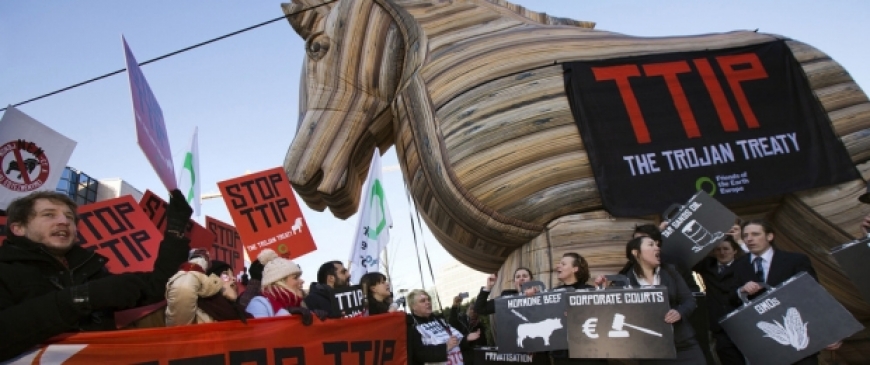
Debunking three myths about TTIP
Over the last couple of years a menacing and secretive global power, known only by its acronym, has emerged. It operates across borders, with scant regard for international law – let alone the lives of those under its rule. Left unchecked, it poses an existential threat to Western civilisation.
I am, of course, talking about TTIP. The Transatlantic Trade and Investment Partnership, to give it its full name, has become a bête noire for people of pretty much any political persuasion. For the left, it heralds mass privatisation; for some on the right, it’s another step in the direction of European federalisation.
Critics have warned of the erosion of civil liberties and the destruction of public services if the deal goes through. But why does the treaty attract so much opprobrium, and is it really justified?
Rem Korteweg, a Senior Fellow at the Centre for European Reform,argues that much of the criticism comes from a blend of anti-Americanism and euro-scepticism.
“The EU is also negotiating with Japan and a number of South-East Asian countries. And you hear literally no one talking about it. The only reason I can see is that there is this concern which is more based on anti-Americanism and euro-scepticism rather than a real rational debate about the contents of TTIP,” Korteweg says.
So what is really at stake?
Secrecy
TTIP has been widely criticised for the cloak and dagger nature of its negotiations. Reports have emerged of high-security ‘reading rooms’ where top-level officials can read the details of the proposals. But they can’t take any notes, let alone share information with the public.
While this may sound like some nightmarish plutocratic conspiracy, the reality is that details of any such negotiations have to be kept confidential. Both parties – the US and the EU – want to negotiate a deal that best serves their own interests. That means playing your cards close to your chest.
In fact, Korteweg thinks the Commission is being too open for its own good. “By being transparent, the Commission is undermining its own negotiating position,” he said. “How do you expect two negotiators from equally sized trading blocs to hammer out a good deal if they can’t do that under some sort of confidentiality?”
An experienced EU negotiator also expressed confidence in the process: “The relatively closed negotiating format makes it easy for critics to set sensational stories running. And the highly technical nature of the subject matter makes it difficult to counter them. But in practice, EU officials are attentive to public opinion and take their cue from governments,” he said over the phone.
The NHS and public services
This secrecy does, of course, fuel fears about the treaty’s contents. But even explicit assurances from negotiators have been ignored by the treaty’s critics, who claim that the NHS and other public services risk privatisation under its terms.
In an attempt to dispel some of these myths, EU Trade Commissioner Cecilia Malmström wrote to Lord Livingston, then Minister for Trade and Investment, in January.
“Member states do not have to open public health services to competition from private providers, nor do they have to outsource services to private providers,” Malmström wrote.
And yet sceptics continue claim that the Commission may renege on its promises. But as Rem Korteweg argues, “that would be political suicide under the current constellation of political forces in Europe.
“If healthcare were to be privatised by the current government, it would have little to do with TTIP. TTIP is getting the blame for all of the policies that particular governments might be willing to push through. But if a government wants to privatise its healthcare services, for whatever reason, that government can do that. But it wouldn’t be because of TTIP that it would be forced to do so,” he said.
Corporate power
Investor-State Dispute Settlement (ISDS) has raised fears of corporations holding governments to ransom and forcing them to act against the interests of the public. This happened when tobacco firm Philip Morris attempted to sue the Australian government for introducing plain packaging for on cigarettes.
Proponents of this kind of arbitration argue that it is necessary to ensure that the rights of companies are upheld. Without that kind of assurance, they are far less willing to make investments in countries for fear unexpected shifts in policy.
But even supporters of TTIP are critical of the initial proposal, which was panned for being unaccountable and weighted in the favour of corporations. But the Commission has responded to pressure. The initial proposal was “inherently flawed,” says Korteweg, but the move to an Investor Court System – with appointed judges – is “a step in the right direction.”
“Politically, I don’t know if this will pass. The US congress is a little hesitant when it comes to setting up new courts. But I do think this shows that the EU commission is willing to listen to protests on the streets,” he argued.
In short, TTIP is far from perfect. But it is not the brainchild of a shady Brussels technocracy intent on bypassing all democratic process. To believe that is to play into the scare-mongering tactics of the hard-line euro-sceptics and to derail any prospect of constructive debate about what this really means for Europe.
Interview with Rem Korteweg, a senior research fellow at the Centre for European Reform.
